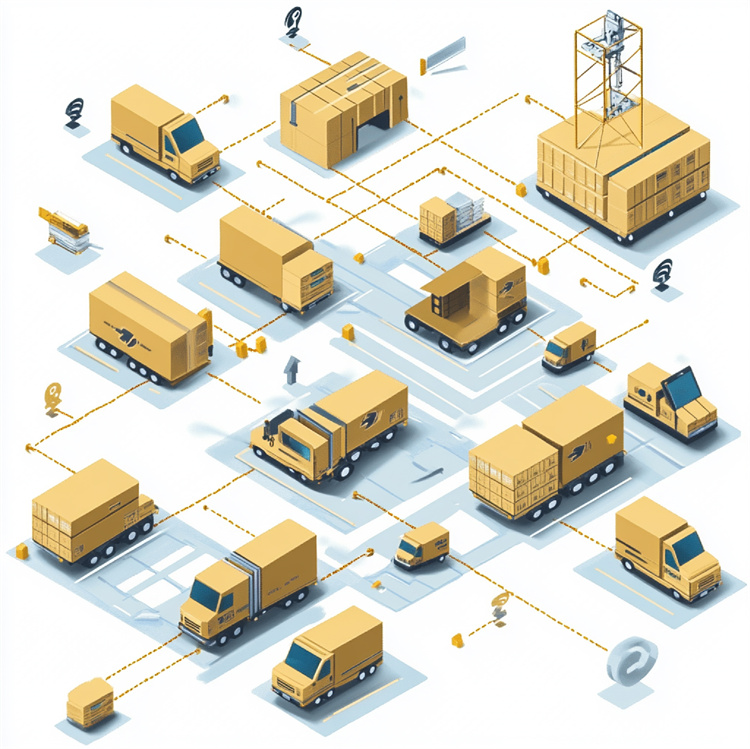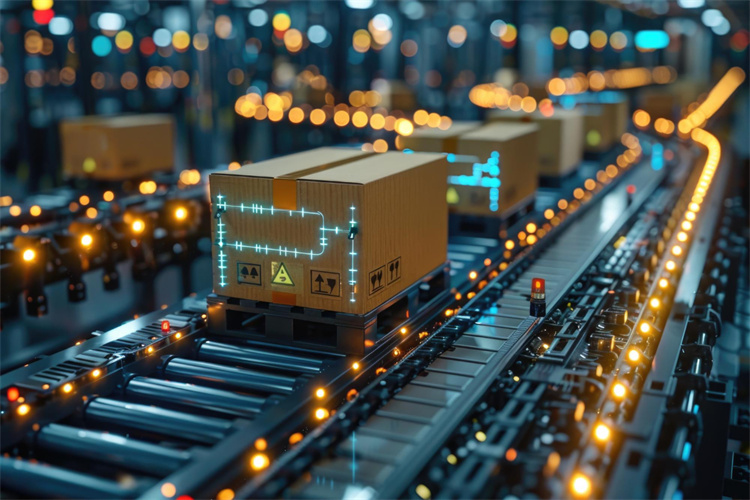Elevating Supply Chain Processes with Artificial Intelligence

Artificial Intelligence (AI) transforms supply chain management. AI applications enhance efficiency and speed in supply chain processes. Early adopters report a 15% decrease in logistics costs. Accurate demand forecasting becomes possible with AI, allowing businesses to adjust inventory levels. Autonomous forklifts, used by companies like DHL, exemplify AI's impact. Explainable AI (XAI) revolutionizes interactions within supply chains. Understanding AI's role in modern supply chains is crucial for businesses seeking competitive advantages.
Benefits of AI in Supply Chain

Enhanced Efficiency
Automation of Repetitive Tasks
AI technology automates repetitive tasks in supply chains. Machines handle data entry, order processing, and inventory checks. Automation leads to higher productivity. Human error decreases significantly. Companies experience smoother operations.
Real-time Data Processing
AI processes data in real time. Supply chain managers receive instant updates. Quick access to information improves decision-making. Businesses respond faster to market changes. Real-time data enhances overall efficiency.
Cost Reduction
Optimized Inventory Management
AI optimizes inventory management. Systems analyze sales trends and stock levels. Businesses maintain optimal inventory. Overstocking and stockouts decrease. Companies save money on storage costs.
Reduced Operational Costs
AI reduces operational costs. Automated systems lower labor expenses. Energy-efficient processes cut utility bills. Companies report a 15% decrease in logistics costs. Cost savings boost profitability.
Improved Decision-Making
Predictive Analytics
AI uses predictive analytics for decision-making. Systems analyze historical data and forecast trends. Managers make informed choices. Predictions help in planning production schedules. Businesses stay ahead of competitors.
Demand Forecasting
AI excels in demand forecasting. Accurate forecasts prevent overproduction. Companies adjust inventory based on predicted demand. Supply chain disruptions reduce. Businesses meet customer needs effectively.
Challenges of Implementing AI
Technical Challenges
Data Quality and Integration
Data quality poses a significant challenge in AI implementation. Supply chain systems rely on accurate data for effective decision-making. Inaccurate data leads to flawed outcomes. Companies must ensure data accuracy. Integration of data from various sources also presents difficulties. Systems require seamless data flow. Businesses need robust integration solutions.
Complexity of AI Systems
AI systems exhibit complexity. Supply chain managers face challenges in understanding these systems. Complex algorithms require specialized knowledge. Companies must invest in training. Simplifying AI systems enhances usability. Businesses benefit from user-friendly interfaces.
Organizational Challenges
Resistance to Change
Resistance to change occurs frequently in organizations. Employees often feel threatened by AI technologies. Fear of job loss creates apprehension. Companies must address these concerns. Effective communication alleviates fears. Training programs help employees adapt.
Skill Gaps in Workforce
Skill gaps hinder AI implementation. Many employees lack AI expertise. Companies face challenges in finding skilled workers. Training programs bridge this gap. Businesses must invest in education. Upskilling the workforce enhances productivity.
AI Applications in Supply Chain

Inventory Management
Automated Stock Replenishment
AI technology revolutionizes inventory management by automating stock replenishment. Warehouse managers use AI to monitor inventory levels continuously. AI systems predict when stock levels fall below a certain threshold. The system triggers automatic orders to replenish stock. This process reduces the risk of stockouts and overstocking. Businesses maintain optimal inventory levels without manual intervention.
Inventory Optimization
AI tools optimize inventory by analyzing sales trends and customer demand. Businesses use AI to forecast future demand accurately. AI systems adjust inventory levels based on these forecasts. Companies reduce storage costs and avoid excess inventory. AI applications enhance decision-making in inventory management. Businesses improve efficiency and customer satisfaction.
Logistics and Transportation
Route Optimization
AI enhances logistics by optimizing transportation routes. Companies use AI to analyze traffic patterns and delivery schedules. AI systems identify the most efficient routes for deliveries. Businesses reduce fuel consumption and delivery times. Route optimization leads to cost savings and improved service quality. AI applications streamline logistics operations effectively.
Autonomous Vehicles
AI drives innovation in transportation with autonomous vehicles. Companies like DHL implement AI-powered forklifts in warehouses. Autonomous vehicles perform tasks without human intervention. Businesses experience increased productivity and reduced labor costs. AI applications improve safety and efficiency in logistics. Autonomous vehicles represent the future of supply chain transportation.
Supplier Relationship Management
Supplier Risk Assessment
AI tools assess risks associated with suppliers. Businesses use AI to evaluate supplier performance and reliability. AI systems analyze data from various sources to identify potential risks. Companies make informed decisions about supplier partnerships. Supplier risk assessment ensures a stable and reliable supply chain. AI applications enhance supplier relationship management.
Contract Management
AI streamlines contract management processes. Businesses use AI to automate contract creation and monitoring. AI systems ensure compliance with contractual obligations. Companies reduce errors and save time in contract management. AI applications improve accuracy and efficiency in supplier relationships. Businesses benefit from streamlined contract management processes.
Future Implications of AI in Supply Chain
Emerging Trends
AI and IoT Integration
AI and IoT integration transforms supply chain operations. Businesses use AI to analyze data from IoT devices. This analysis provides real-time insights into inventory levels and equipment status. Companies optimize resource allocation and reduce downtime. AI and IoT integration enhances supply chain visibility. Managers make informed decisions based on accurate data.
Blockchain and AI Synergy
Blockchain and AI synergy revolutionizes supply chain transparency. Companies use blockchain to secure data and ensure traceability. AI analyzes blockchain data to identify patterns and trends. Businesses improve fraud detection and enhance trust among stakeholders. Blockchain and AI synergy strengthens supply chain security. Companies benefit from efficient and reliable operations.
Long-term Impact
Sustainable Supply Chains
AI promotes sustainable supply chains. Businesses use AI to optimize energy consumption and reduce waste. AI systems analyze production processes to identify inefficiencies. Companies implement eco-friendly practices based on AI recommendations. Sustainable supply chains contribute to environmental conservation. Businesses achieve cost savings and enhance brand reputation.
Global Supply Chain Resilience
AI enhances global supply chain resilience. Companies use AI to predict disruptions and mitigate risks. AI systems analyze geopolitical events and weather patterns. Businesses develop contingency plans based on AI forecasts. Global supply chain resilience ensures continuity in operations. Companies maintain competitiveness in dynamic markets.
AI plays a crucial role in streamlining supply chain processes. Automated systems enhance productivity and reduce human error. AI technologies help businesses understand customer behavior patterns. Companies can target customers with customized offerings. This approach directly impacts sales growth and revenue. Explainable AI (XAI) revolutionizes supply chains by explaining decisions. XAI enhances collaboration between human experts and AI systems. Businesses achieve more robust and adaptable supply chain options. Embrace AI technologies to gain a competitive edge. Implement AI solutions to optimize operations and drive efficiency.
See Also
Efficient Solutions for Supply Chain Challenges in High-Tech Manufacturing
AI Supply Chain Innovations: Enhancing Operational Efficiency
Reshaping Industries with Cloud-Based Supply Chain Solutions
Tomorrow's Logistics Revolutionized by AI in Supply Chain
Revealing 5 Cutting-Edge Techniques for Supply Chain Optimization
